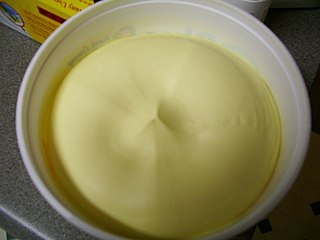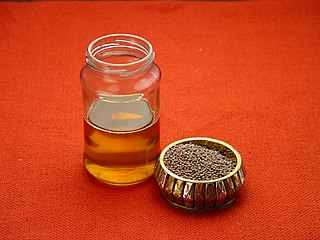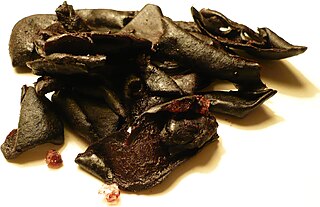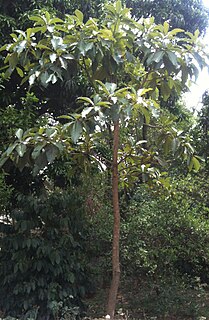
The almond is a species of tree native to Iran and surrounding countries but widely cultivated elsewhere. The almond is also the name of the edible and widely cultivated seed of this tree. Within the genus Prunus, it is classified with the peach in the subgenus Amygdalus, distinguished from the other subgenera by corrugations on the shell (endocarp) surrounding the seed.

Amygdalin is a naturally occurring chemical compound best known for being falsely promoted as a cancer cure. It is found in many plants, but most notably in the seeds (kernels) of apricots, bitter almonds, apples, peaches, and plums.
Omega−3 fatty acids, also called Omega-3 oils, ω−3 fatty acids or n−3 fatty acids, are polyunsaturated fatty acids (PUFAs) characterized by the presence of a double bond three atoms away from the terminal methyl group in their chemical structure. They are widely distributed in nature, being important constituents of animal lipid metabolism, and they play an important role in the human diet and in human physiology. The three types of omega−3 fatty acids involved in human physiology are α-linolenic acid (ALA), found in plant oils, and eicosapentaenoic acid (EPA) and docosahexaenoic acid (DHA), both commonly found in marine oils. Marine algae and phytoplankton are primary sources of omega−3 fatty acids. Common sources of plant oils containing ALA include walnut, edible seeds, clary sage seed oil, algal oil, flaxseed oil, Sacha Inchi oil, Echium oil, and hemp oil, while sources of animal omega−3 fatty acids EPA and DHA include fish, fish oils, eggs from chickens, squid oils and krill oil.

The sunflower seed is the fruit of the sunflower. There are three types of commonly used sunflower seeds: linoleic, high oleic, and sunflower oil seeds. Each variety has its own unique levels of monounsaturated, saturated, and polyunsaturated fats. The information in this article refers mainly to the linoleic variety.
Essential fatty acids, or EFAs, are fatty acids that humans and other animals must ingest because the body requires them for good health but cannot synthesize them.

Margarine is a spread used for flavoring, baking and cooking. It is most often used as an inexpensive butter substitute. It was named oleomargarine from Latin for oleum and Greek margarite but was later named margarine.
Omega-6 fatty acids are a family of polyunsaturated fatty acids that have in common a final carbon-carbon double bond in the n-6 position, that is, the sixth bond, counting from the methyl end.

The term mustard oil is used for two different oils that are made from mustard seeds:

Vegetarian nutrition is the set of health-related challenges and advantages of vegetarian diets.
Rose hip seed oil is a pressed seed oil, extracted from the seeds of the wild rose bush in the southern Andes. Rosehip seed oil can also be extracted from Rosa canina, which grows in many regions of the world including South Africa and Europe. The fruits of the rosehip have been used in folk medicine for a long time. Rosehips have prophylactic and therapeutic actions against the common cold, infectious diseases, gastrointestinal disorders, urinary tract diseases, and inflammatory diseases.

Astrocaryum murumuru is a palm native to Amazon Rainforest vegetation in Brazil, which bears edible fruits. Murumuru butter, extracted from the seeds of the plant, may be used as a moisturizer.

In cuisine, dry nuts are dry, edible fruits or seeds that usually, but not always, have a high fat content.

Cucumeropsis mannii is a species of melon native to tropical Africa west of the East African Rift, where it is grown for food and as a source of oil.
Vateria indica oil is extracted from the seeds of the Vateria indica plant, a species in the family Dipterocarpaceae. The Vateria indica plant is indigenous to the Western Ghats, Kerala and Tamil Nadu regions of India. It thrives in the evergreen forests, surviving up to 800 meters above sea level. Oil from the seeds of the plant is extracted through a chemical refining process which makes the plant edible.

Kokum oil is a seed oil derived from the seeds of the kokum tree. Kokum oil is edible and can also be used for things other than cooking.

Phulwara oil is extracted from seeds of Phulwara tree. Phulwara Trees are also known locally as Chiuri Trees, Kaeleb Trees, or Butter Nut Trees. Refined Phulwara Oil is marketed as Phulwara Ghee.
Beard oil is a cosmetic product for men that is used to nourish both the skin under the beard and the beard itself in order to keep it "soft, shiny, and smooth". Beard oil mimics the natural oils produced by skin, such as sebum, and is composed mainly of carrier oils and essential oils.











